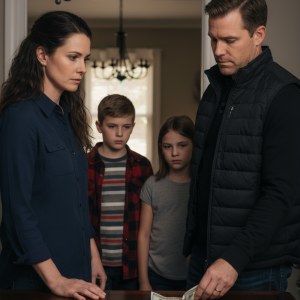The Favored Son and the Family Scapegoat
I’m thirty‑five, and my relatives have finally pushed me past my breaking point. I clawed my way from unpaid intern to mid‑level manager at a major Silicon Valley software firm, earning every cent on my own—yet, to my parents, I remain the designated villain.
Since leaving for college at eighteen, I’ve paid every bill myself. Meanwhile, my younger brother, Jason—now twenty‑seven—was coddled like fragile china. I was the “example,” he was the “baby,” and the roles never shifted.
The double standard was blatant. A single B‑plus earned me a month grounded for “squandering potential,” yet when Jason stole from Dad’s wallet (third strike), it was brushed off as a harmless phase.
Every slip Jason made was excused with “he’s sensitive” or “he’ll learn.” If I so much as stumbled, the sky supposedly fell. “Set a better example,” they’d warn while he basked in protection.
Even my victories came with caveats. When I was named valedictorian, Mom sighed, “I hope this doesn’t upset your brother.” Jason quit community college after one semester—“too stressful”—and my parents funded a “gap year” that ballooned into five. I juggled two part‑time jobs, student loans, and ramen dinners; Dad still charged me rent at eighteen, yet Jason never handed over a dime.
Fast‑forward to last week: Mom called—rare in itself—opening with sugary small talk about my “cat” (I’ve never owned one). My stomach sank; something was brewing.
She dropped the bomb: Jason owed $40,000 to some very shady people demanding repayment.
When I asked how he’d managed to dig that hole, she waved it away. “Doesn’t matter—family helps family.”
They’d used that mantra for years, each time I patched Jason’s messes. But forty grand? That was my emergency cushion.
So, for the first time in my life, I said no.
Mom’s tone flipped from pleading to furious. “Selfish!” she shrieked. “Do you want your brother’s blood on your hands?”
Her manipulation was laughably transparent. I hung up, hands shaking—yet under the guilt, a surge of relief: I’d finally drawn a line.
Betrayal Gets Ugly
The harassment started instantly—guilt‑soaked texts, then worse. My bank flagged an attempt to access my account using my mother’s maiden name, my Social Security number, even my first‑pet answer. Only Jason knew all that. Realizing my own brother tried to rob me cut deeper than anything.
I called Aunt Katherine—one of the few neutral parties. She’d heard a different tale: I was the heartless hoarder while poor Jason fought for his life. Turns out he’d hit up half the relatives with varying sob stories; forty grand was just the surface.
Then Dad emailed—icy and threatening. “If you abandon your brother, there will be consequences.” He even claimed they’d financed my education—laughable, considering my lingering student loans. The message was clear: pay up or be exiled.
The Showdown
I confronted Jason at his dingy apartment. Unshaven, hollow‑eyed, he greeted me with, “Took you long enough.”
I asked about the bank‑fraud attempt. He shrugged: “Mom and Dad said you’d cave if things got serious. I just sped it up.” His nonchalance was chilling.
Right then, our parents barged in. A three‑way shouting match exploded. They defended the fraud: “He was desperate—you left him no choice!”
“So crime’s fine if it’s ‘for family’?” I yelled. Dad’s reply: “Family helps family, no matter what.”
I snapped. Years of suppressed anger poured out—how their favoritism molded Jason into this.
Jason sneered, “At least I’m not some stuck‑up b*tch.” Mom silently agreed.
I hit record earlier, and now I played back their whole confession approving bank fraud. Their faces drained of color.
“This goes to the police if you touch my accounts again,” I said, heading for the door. Dad grabbed my arm: “Walk out and you’re no longer family.”
“That’s a promise, not a threat,” I replied, and left.
Fallout and Liberation
Back home, I blocked their numbers and emailed every relative: screenshots of threats, transcript of the recording, proof of the attempted fraud. I refused to be their secret‑keeper anymore.
Then I posted everything on social media. The response was volcanic—cousins, an aunt, even an ex‑roommate surfaced with their own Jason horror stories.
An HR rep at a company where Jason had interviewed saw the thread—goodbye job offer. My parents’ sterling reputation shattered; the friends who once pitied them began to vanish. Jason’s roommate served him an eviction notice.
Rumor has it Jason now juggles three dead‑end jobs to chip away at his debts. His credit’s wrecked, and for once, consequences stick. My parents have gone radio‑silent online.
Meanwhile, my life skyrocketed. I snagged the promotion I’d chased, started dating someone who honors boundaries, and—sweetest victory—my parents stopped meddling. No more guilt, no more strings.
To anyone trapped in toxic family dynamics: truth is a weapon. Speaking up freed me and empowered others. I’m crafting a new family now—one built on integrity, accountability, and real love. No lawsuit could match the peace of finally living on my own terms.





